After five years of being unable to celebrate Eid al-Adha in my hometown, on Thursday, June 29th, 2023, I woke up at five thirty this morning.
I hurriedly made my way to the bathroom to cleanse my body using a dipper. The weather was, as usual, bone-chillingly cold, I shiver, and the sound of takbir continued to resonate from the At-Taqwa Mosque field in Kalasan, Sleman.
After the Fajr prayer, I headed with a motorbike to the At-Taqwa Mosque field to perform the Eid prayer.
Kalasan, with its abundance of trees, offers a truly refreshing morning air.
The streets were veiled in mist and filled with people walking towards the mosque on foot for the congregational prayer young and old, male and female.
Meanwhile, on the field, there was a sea of humanity overflowing. Everyone was busy preparing themselves for the prayer.
After reaching the location, the weather was cloudy, yet I paid no heed. I sat down and prepared myself, wholeheartedly joining the Takbiran.
The imam for the Eid al-Adha prayer and the khatib today was Riki Habibullah. His voice was melodious, and I became enthralled as I listened to the recitation of the sacred verses in both the first and second rakaats of prayer.
At least this could partially alleviate my yearning for my parents back home. I ain't sure why, but this year I could truly relish the Eid prayer with profound devotion.
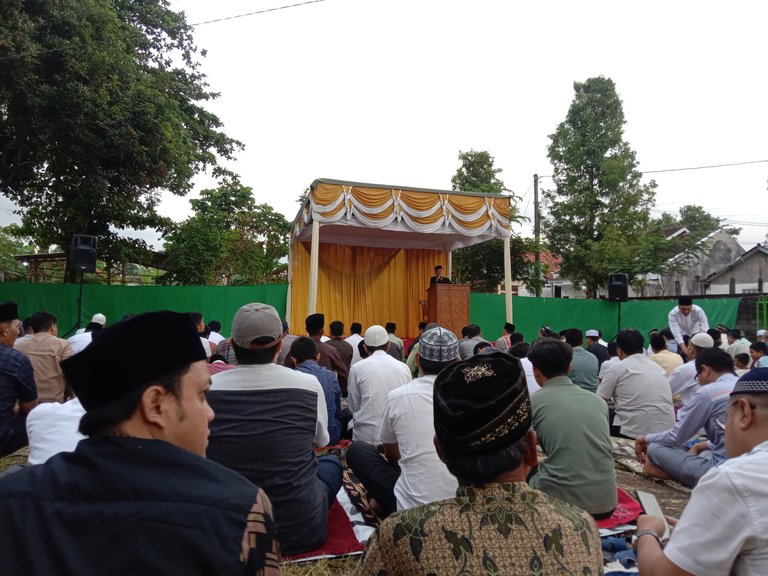
Riki, in his khotbah, emphasized that this year's Eid al-Adha should be interpreted with taqwa, which is implemented through righteous deeds.
The concept of righteousness here goes beyond mere ritualistic acts towards Allah; it also extends to social goodness, particularly towards the surrounding community and neighbors.
This is significant as the area where I reside holds Eid prayers twice: on Wednesday, June 28, and today, Thursday, June 29, 2023.
"Differences of opinion, whatever they may be when characterized by tolerance, that is love. Especially since we live in Indonesia, where it is clear that we must respect and honor one another," said Riki.
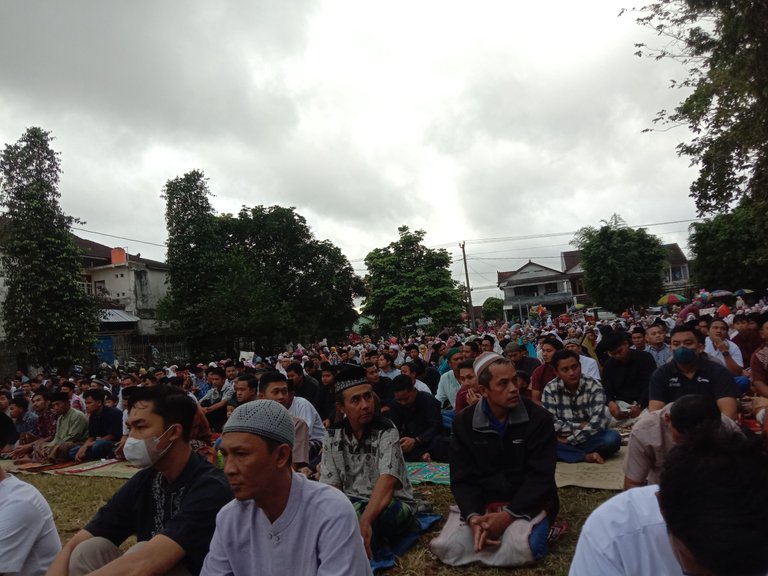
Another wisdom of Eid al-Adha lies in the mandated act of sacrificing animals as Qurban.
In the context of Indonesia, the sacrificial animals could be sheep, goats, cows, or even buffaloes. The meat is then distributed, prioritizing the less fortunate people.
This is what is known as "saleh sosial" (social righteousness). Saleh sosial is a term introduced by Mustofa Bisri in his book titled "Saleh Ritual Saleh Sosial".
The concept of kesalehan sosial emphasizes that a person's righteousness should not only be measured by their dedication to religious practices, but also by their treatment of other human beings, neighbors, and the environment.
Being righteous towards the Creator is demonstrated through righteousness (love and compassion) towards fellow creations.
I felt what Riki means. Our nation is weary of the multitude of divisive issues.
Especially considering that on Wednesday, February 14, 2024, Indonesia is scheduled to hold the Pilpres 2024.
The previous presidential election divided our nation into two opposing camps, often referred to as "Cebong" and "Kampret," which became symbols of ideological differences and political views.
Indeed, during that time, the division went beyond mere political polarization and extended into the religious realm.
It's disheartening to acknowledge that there were instances where individuals exploited religious sentiments and engaged in the unethical practice of "buying and selling ayat" for their gain.
Perhaps this is what Riki meant; in bahasa we could say, "Cukup hewan yang boleh diqurbankan, bangsa ini jangan!"
Which translates to "It is enough to sacrifice the animals that are permissible; our nation should not sacrifice its unity and harmony!"
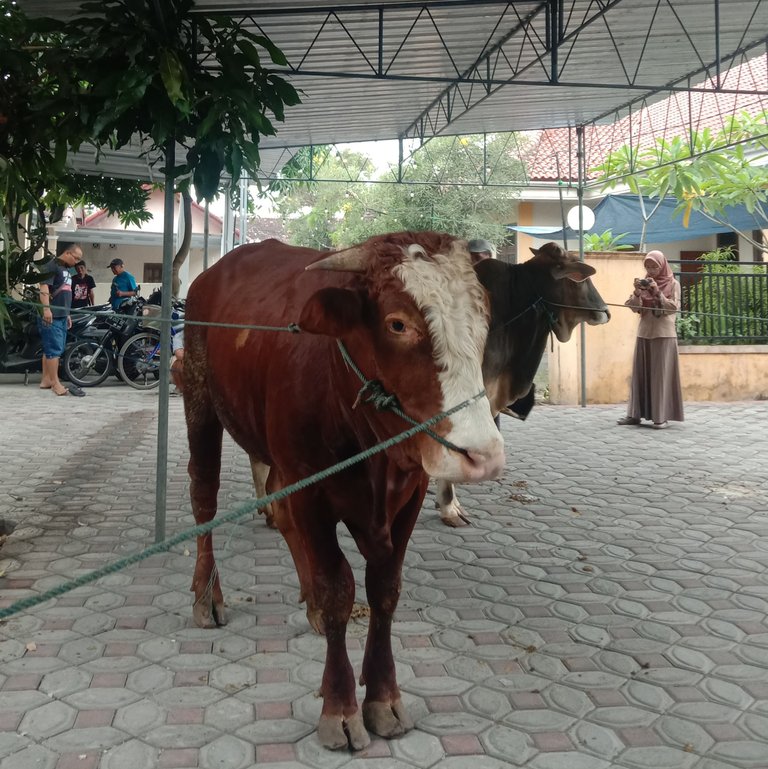
A total of thirteen cows and ten goats were sacrificed as Qurban animals at Nurul Islam Mosque in Kadirojo, during a drizzling rain, around eight o'clock.
The residents eagerly watched as the animals were slaughtered one by one, especially the children. This annual moment is indeed worthy of celebration.
For migrants like myself, this is a moment to forge bonds with the local community, which is a rare occurrence when residing in big cities like Yogyakarta.
The culture of cooperation, known as "gotong royong," which is the cornerstone of our nation, has even become what Sukarno referred to as weltanschauung, or a worldview, manifested in the foundational principle of the Indonesian state, Pancasila.
This cultural value emphasizes unity, solidarity, and collective responsibility.
It aligns with what Riki meant by saleh sosial in his morning khotbah. The act of Qurban is not merely about slaughtering animals.
It's a moment where the rich and they are penniless come together. In simple terms, while meat or steak may not be a luxury for the wealthy, for the penniless, being able to consume meat once a year is an extraordinary blessing.
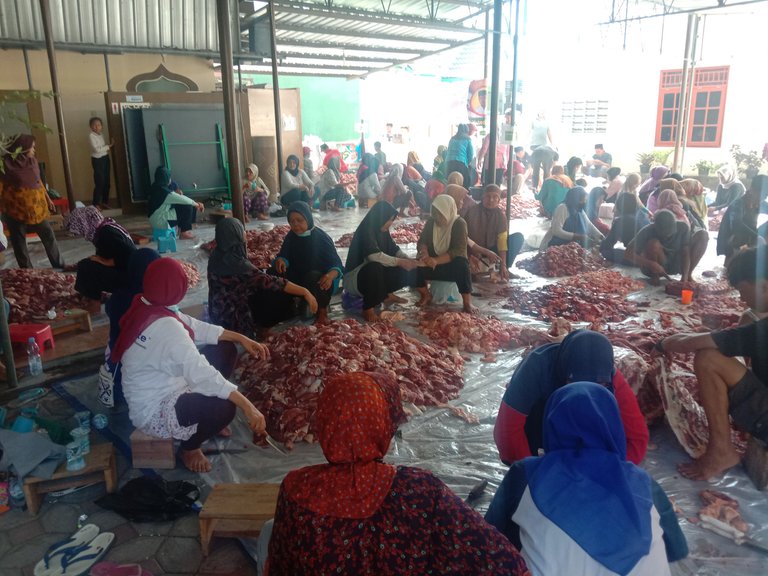
Qurban serves as a reminder of the stark socioeconomic disparities that exist within our society.
It highlights the importance of compassion, empathy, and sharing with those who are less fortunate.
The distribution of Qurban meat to the needy symbolizes the spirit of caring for one another, fostering a sense of solidarity and social justice.
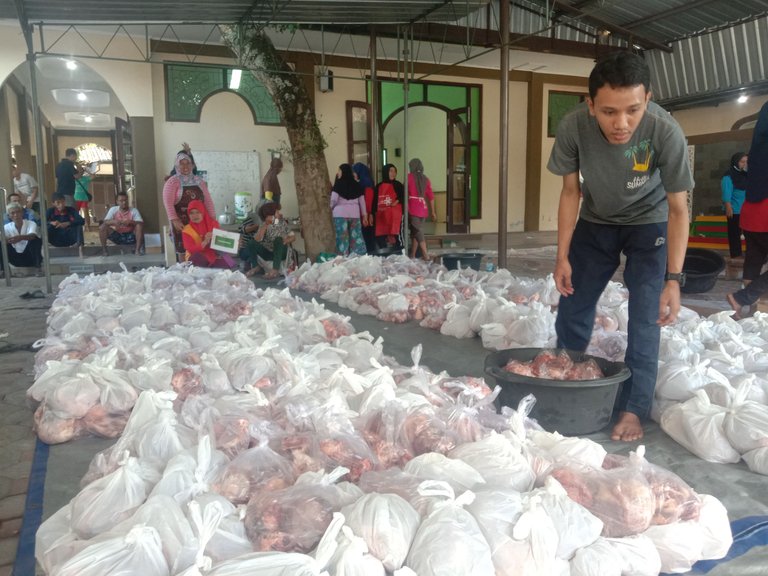
It's through acts of kindness, such as providing food to those in need, that we can bridge the gap between different socioeconomic backgrounds and create a more inclusive society.
However, it ain't limited to the moments of Eid al-Adha alone. Love, mutual support, and social righteousness should be cultivated continuously.
Just like muscles that could be trained, social sensitivity could also be developed through consistent practice. Qurban can serve as a catalyst or a starting point for this process.
The act of Qurban could inspire individuals to reflect upon the essence of sacrifice, empathy, and selflessness.
Absolutely, it's also related to June, as Eid al-Adha this year coincides with the birth month of Pancasila. Let us conclude this vibrant month, known as "Bulan Bung Karno" (Bung Karno's Month), by celebrating unity and solidarity.
By embracing the essence of Pancasila and the values of saleh sosial, we could contribute to the creation of a more inclusive, tolerant, and prosperous society [mhg].